Introduction
Search engine optimization (SEO) plays a vital role in increasing online visibility for both B2B (Business-to-Business) and B2C (Business-to-Consumer) companies. However, the strategies and approaches differ significantly between these two models. Understanding the differences between B2B SEO and B2C SEO can help marketers create effective strategies tailored to their target audiences. This article explores the key differences, focusing on audience, goals, keyword strategies, content types, and more.
What is B2B SEO?
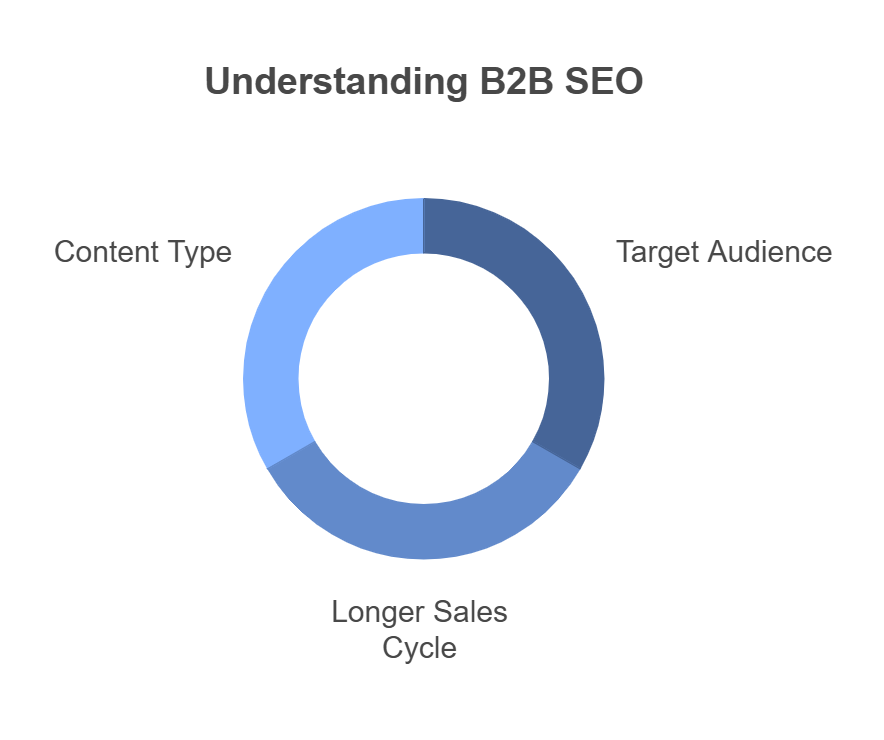
B2B SEO refers to the optimization strategies used by businesses that sell products or services to other businesses. The primary focus is on reaching decision-makers, industry professionals, and corporate clients.
Characteristics of B2B SEO
- Target Audience: B2B SEO targets a specific, niche audience, often including executives, managers, and procurement officers.
- Longer Sales Cycle: The decision-making process in B2B transactions typically involves multiple stakeholders and extensive research.
- Content Type: B2B content often includes white papers, case studies, and detailed articles that provide valuable insights.
What is B2C SEO?
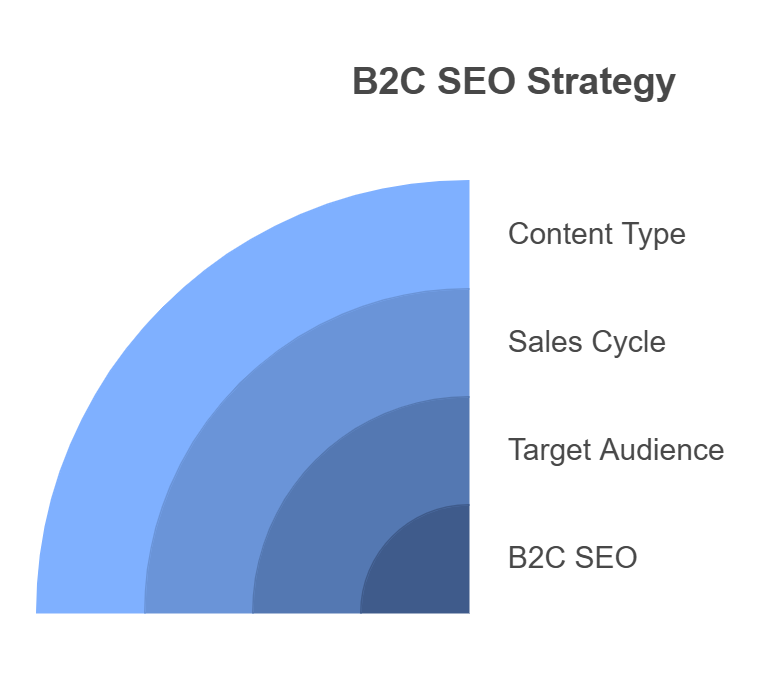
B2C SEO, on the other hand, is tailored for businesses that sell directly to consumers. This approach aims to attract a broader audience and encourages immediate purchases.
Characteristics of B2C SEO
- Target Audience: B2C SEO focuses on individual consumers looking for products or services for personal use.
- Shorter Sales Cycle: B2C transactions often involve quicker decision-making processes based on emotional responses and brand loyalty.
- Content Type: B2C content typically includes product descriptions, customer reviews, and engaging blog posts that drive sales.
Key Differences Between B2B SEO and B2C SEO
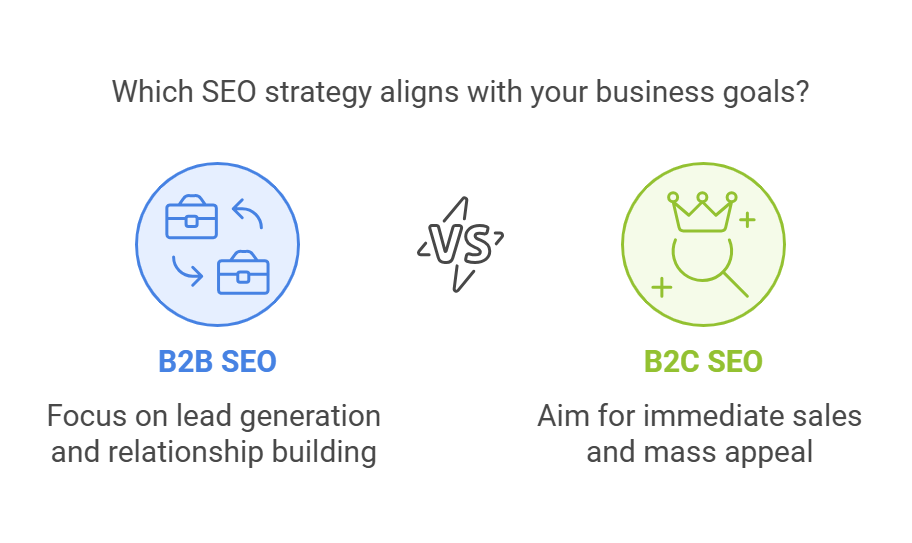
1. Target Audience
- B2B SEO: Focuses on a niche market consisting of business professionals and decision-makers. This audience is often harder to reach but is more likely to convert when engaged.
- B2C SEO: Aims at a larger audience of everyday consumers. The focus is on mass appeal and driving immediate purchases.
2. Keyword Strategy
- B2B SEO: Utilizes longer-tail, industry-specific keywords. Keywords often reflect specific problems businesses face, such as “best project management software for teams.”
- B2C SEO: Emphasizes shorter, more general keywords that reflect consumer intent, such as “buy running shoes online.”
3. Content Type and Length
- B2B SEO: Prioritizes in-depth, informative content, including white papers, webinars, and detailed articles. The content is often longer and geared toward educating the reader.
- B2C SEO: Focuses on engaging, visually appealing content like product pages, short blogs, and videos that capture attention quickly.
4. Conversion Goals
- B2B SEO: Aims to generate leads and build relationships over time. Conversions may involve filling out forms, subscribing to newsletters, or requesting product demos.
- B2C SEO: Focuses on immediate sales conversions, such as completing purchases or signing up for promotional offers.
5. SEO Strategies and Techniques
- B2B SEO: Employs strategies like LinkedIn marketing, guest blogging on industry-specific websites, and establishing partnerships with influencers in the business space.
- B2C SEO: Uses social media advertising, influencer marketing, and promotions to capture consumer attention and drive traffic to the website.
B2B vs. B2C Mobile SEO: Key Insights and Strategies
Mobile SEO is essential for both B2B and B2C websites. However, the strategies you use will vary. Here are the key differences and best practices for mobile SEO in both types of businesses.
1. Mobile Optimization for B2B
B2B websites often feature detailed content like case studies and industry reports. On mobile, this content should be easy to find and read.
Key B2B Mobile SEO Tips:
- Fast Load Times: B2B users need quick access to information. Ensure pages load fast.
- Simple Design: Keep the layout clean and easy to navigate for business professionals.
2. Mobile Optimization for B2C
For B2C websites, the focus is on a smooth, quick shopping experience. Customers want to buy products without hassle.
Key B2C Mobile SEO Tips:
- Responsive Design: Ensure your website works well on any mobile device.
- Actionable Keywords: Use phrases like “Buy Now” or “Shop Now” to encourage instant purchases.
3. Mobile Speed and Performance
A fast website is essential for both B2B and B2C sites. Slow loading speeds can make users leave the site.
For B2B:
- Compress large files like documents and images for faster loading.
- Optimize PDFs and other resources to ensure quick access.
For B2C:
- Use auto-loading images and compress videos to speed up product pages.
- Make the shopping experience quick and smooth.
4. Mobile UX (User Experience)
A good user experience is key for mobile SEO. A site with poor UX will have higher bounce rates.
B2B Mobile UX:
- Keep navigation easy for quick access to information.
- Make content clear and valuable to business users.
B2C Mobile UX:
- Make your design visually appealing and easy to navigate.
- Simplify the checkout process for quick purchases.
5. Voice Search Optimization
With voice search growing in popularity, it’s important to optimize your content for voice queries.
For B2B:
- Use long-tail keywords and create FAQ pages to answer common business questions.
For B2C:
- Write simple answers to common questions in natural language.
Common Questions About B2B SEO and B2C SEO
Q1: Can a business use both B2B and B2C SEO strategies?
Yes, many businesses operate in both B2B and B2C markets. It’s crucial to develop separate SEO strategies for each audience to address their unique needs effectively.
Q2: How long does it take to see results from B2B or B2C SEO?
The timeline for seeing results can vary. B2B SEO may take longer due to the complex decision-making processes, while B2C SEO often yields quicker results due to impulse buying behaviors.
Q3: Which SEO approach is more effective for my business?
The effectiveness of an SEO strategy depends on your specific business model and target audience. Assess your goals and choose the strategy that aligns best with your objectives.
Actionable Insights for Implementing B2B and B2C SEO
- Understand Your Audience: Take the time to research and analyze your target audience. Use tools like Google Analytics to gather insights on demographics and behaviors.
- Choose the Right Keywords: Conduct thorough keyword research to identify relevant keywords for your audience. For B2B, focus on industry-specific terms, while for B2C, opt for more general search terms.
- Create Quality Content: Whether you’re focusing on B2B or B2C, high-quality, relevant content is essential. Ensure your content answers your audience’s questions and provides real value.
- Optimize for Conversions: Ensure your website design encourages conversions, whether through lead generation forms for B2B or clear calls to action for B2C purchases.
- Monitor Performance: Regularly analyze your SEO efforts using tools like Google Analytics or SEMrush. Adjust your strategies based on the performance data to improve your results.
Final Thoughts
Understanding the differences between B2B SEO and B2C SEO is crucial for developing effective digital marketing strategies. By recognizing the unique needs and behaviors of each audience, businesses can tailor their SEO efforts to achieve better results. Whether your focus is on generating leads or driving immediate sales, a well-crafted SEO strategy will help you reach your goals.

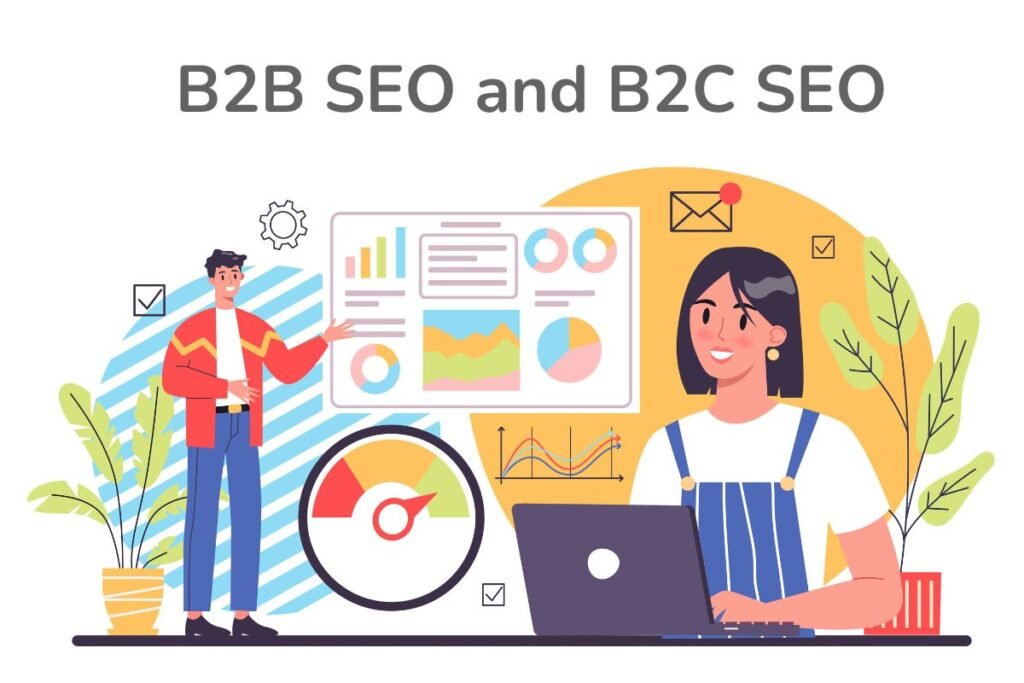
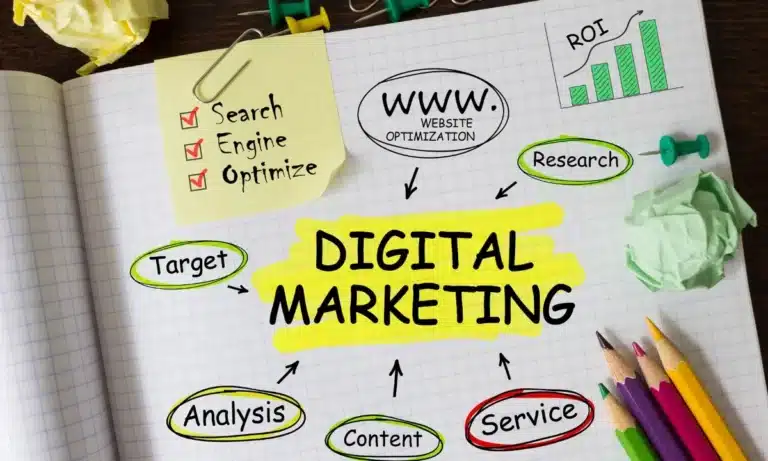





One Response
I like this website very much so much superb information.